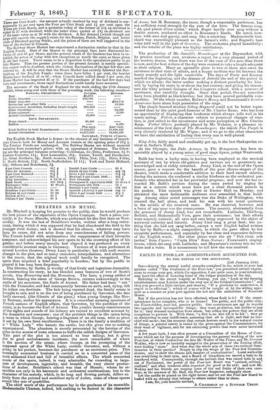FAULTS IN POOR-LAW ADMINISTRATION ACCOUNTED FOR.
TO THE EDITOR OF THE SPECTATOR.
25th January 1849. Sin—Among the several useful remarks contained in the article in your last number called " The Confusion of the Poor-law," you permitted certain expres- sions to escape your pen, which (in opposition, I am quite sure, to your intention) may have the effect of fostering some of the vulgar prejudices of the day. Referring to the recent tragedy at Tooting, you say, " Look at the farming establishments near London under the very eye of the Central Commission!" and then you proceed a little further, and observe, " If a provision be undertaken, it ought to be effectual"; which of course will be caught at by the willing oppo- nent as a censure on your part against the law and the authorities of Somerset House.
But if the provision has not been effectual, whose fault is it? If the super- intendence be not complete, who is to blame? The public, and the public only; the Times-ridden, nose-led, passive public. Our countrymen are apt to require two opposite and incompatible things: they want protection, but dislike to pay for it; they demand exemption from abuse, but refuse the powers that are alone competent to prevent it. With them, "a blot is no blot till it be hit"; they go on slumbering in easy indifference, assuming that all is right, and that no mis- chief will occur; but the moment that certain horrors result in the natural course of things, a general outcry is raised by the press against the Commissioners, for their want of vigilance, and for not exercising powers that were never intrusted to them.
A few years back, I was often present at a Committee of the House of Com- mons which sat fur the purpose of investigating the general working of the new Poor-law, at which Committee the late Mr. Walter of the Times, and Mr. Coroner Wakley, who is now so laudably engaged in the prosecution of the Tooting affair, were leading " stars." And what was the whole aim of these two eminent func- tionaries in their queries? Simply to clip the wings of the Poor-law Commis- sioners, and to show the abuses and dangers of centralization! Local authority was everything in their eyes, and a Board of Guardians too sacred a body to be interfered with. Consequently, through the hubbub that was raised both in and out of Parliament, the power of the Poor-law Board was " cabined, cribbed," confined," and often rendered alike impotent for good or for evil: and now Mr. Wakley and his friends are reaping some of the sad fruits of their own exer- tions, as the answers of Mr. Hall, the Poor-law Inspector, unhappily show.
Let the saddle be placed on the right horse; and let not the Poor-law Board be loaded with an obloquy that belongs to others rather than to them. I am, Sir, your humble servant,
A eflAYMMAN OF A SUFFOLK UNION.


























 Previous page
Previous page